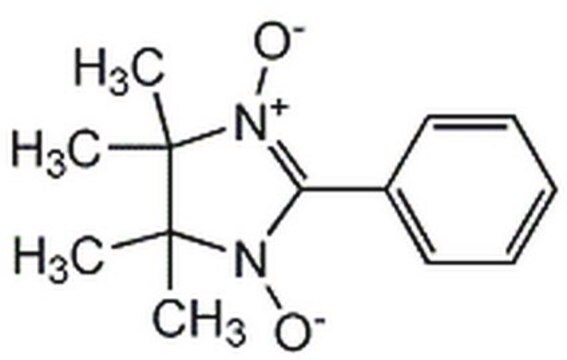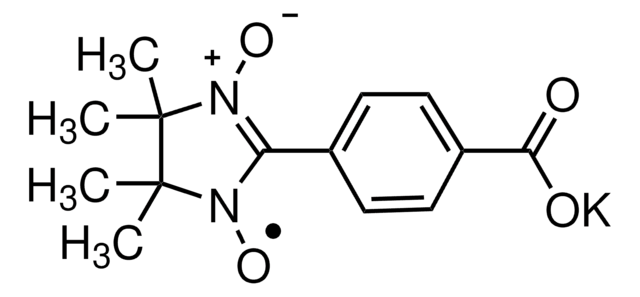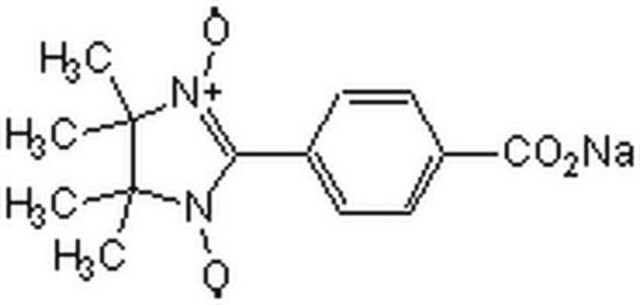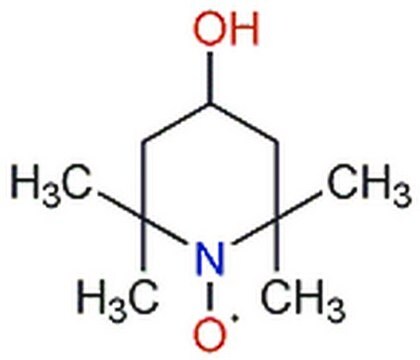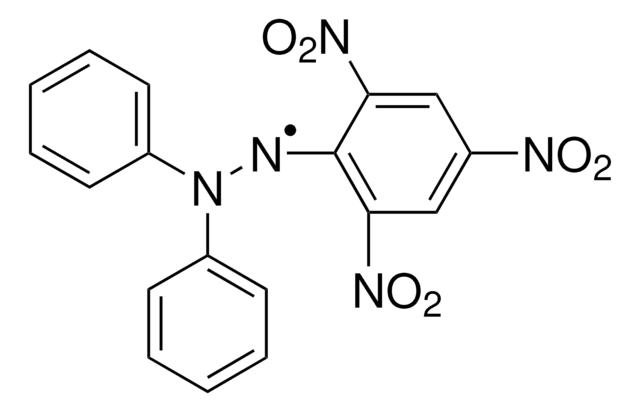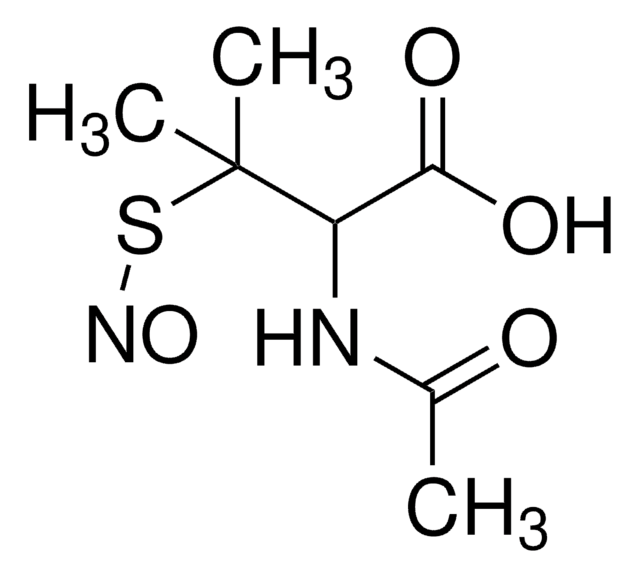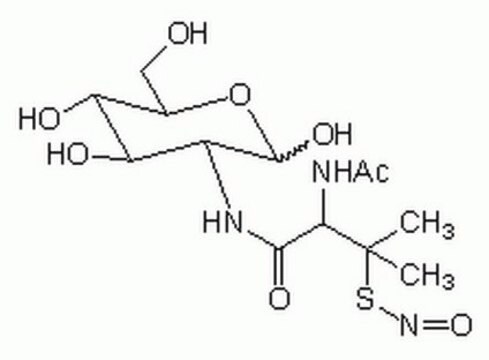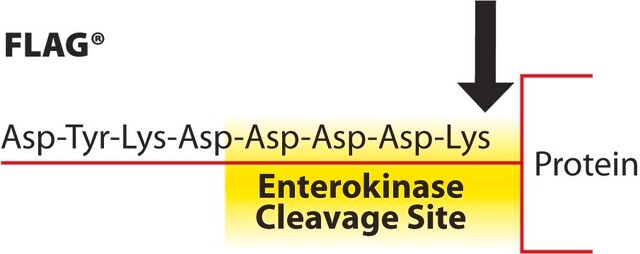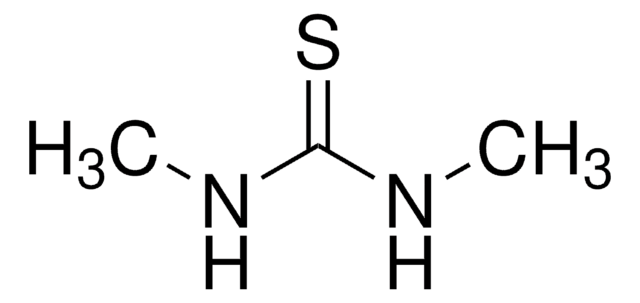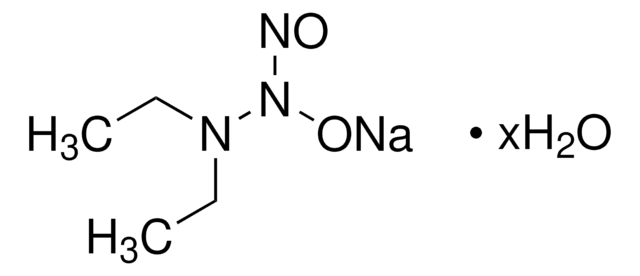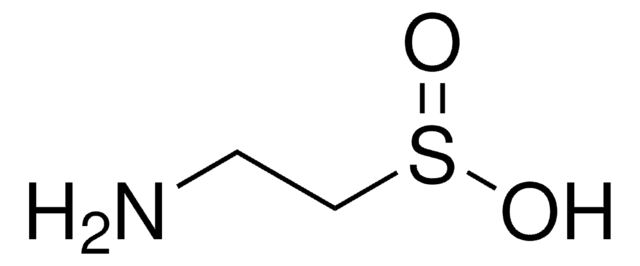P5084
PTIO
Sinónimos:
2-Phenyl-4,4,5,5-tetramethylimidazoline-1-oxyl 3-oxide
Iniciar sesiónpara Ver la Fijación de precios por contrato y de la organización
About This Item
Fórmula empírica (notación de Hill):
C13H17N2O2
Número de CAS:
Peso molecular:
233.29
Número MDL:
Código UNSPSC:
12352200
ID de la sustancia en PubChem:
NACRES:
NA.32
Productos recomendados
Formulario
powder
Nivel de calidad
temp. de almacenamiento
2-8°C
cadena SMILES
CC1(C)N([O])C(c2ccccc2)=[N+]([O-])C1(C)C
InChI
1S/C13H17N2O2/c1-12(2)13(3,4)15(17)11(14(12)16)10-8-6-5-7-9-10/h5-9H,1-4H3
Clave InChI
DYUUGILMVYJEHY-UHFFFAOYSA-N
Aplicación
2-phenyl-4, 4, 5, 5,-tetramethylimidazoline-1-oxyl 3-oxide (PTIO) has been used as a nitric oxide (NO) scavenger.
Acciones bioquímicas o fisiológicas
2-phenyl-4, 4, 5, 5,-tetramethylimidazoline-1-oxyl 3-oxide (PTIOs) derivatives react with nitric oxide (NO) to yield the corresponding imino nitroxides (PTIs) and nitrogen dioxide (NO2).
A stable radical scavenger for nitric oxide; affects NO without affecting NO synthase; has significant inhibitory activity against NO biological actions.
Stable radical scavenger for nitric oxide without affecting NO synthase; inhibits NO activity.
Código de clase de almacenamiento
11 - Combustible Solids
Clase de riesgo para el agua (WGK)
WGK 3
Punto de inflamabilidad (°F)
Not applicable
Punto de inflamabilidad (°C)
Not applicable
Equipo de protección personal
dust mask type N95 (US), Eyeshields, Gloves
Elija entre una de las versiones más recientes:
¿Ya tiene este producto?
Encuentre la documentación para los productos que ha comprado recientemente en la Biblioteca de documentos.
Los clientes también vieron
Jiu-Gang Xue et al.
Journal of neurophysiology, 105(6), 2897-2906 (2011-04-08)
N-methyl-D-aspartate (NMDA) receptors (NMDARs) are implicated in synaptic plasticity and modulation of glutamatergic excitatory transmission. Effect of NMDAR activation on inhibitory GABAergic transmission remains largely unknown. Here, we report that a brief application of NMDA could induce two distinct actions
Reactions of PTIO and carboxy-PTIO with *NO, *NO2, and O2-*.
Goldstein S
The Journal of Biological Chemistry, 278 (51), 50949-50955 (2003)
Christal G Coleman et al.
The Journal of neuroscience : the official journal of the Society for Neuroscience, 30(36), 12103-12112 (2010-09-10)
Chronic intermittent hypoxia (CIH) is a concomitant of sleep apnea that produces a slowly developing chemosensory-dependent blood pressure elevation ascribed in part to NMDA receptor-dependent plasticity and reduced nitric oxide (NO) signaling in the carotid body. The hypothalamic paraventricular nucleus
Victor Parro et al.
Frontiers in microbiology, 10, 929-929 (2019-05-28)
Potential benthic habitats of early Mars lakes, probably oligotrophic, could range from hydrothermal to cold sediments. Dynamic processes in the water column (such as turbidity or UV penetration) as well as in the benthic bed (temperature gradients, turbation, or sedimentation
Victoria P A Johnstone et al.
Learning & memory (Cold Spring Harbor, N.Y.), 18(10), 625-633 (2011-09-22)
Long-term potentiation (LTP) is an important process underlying learning and memory in the brain. At CA3-CA1 synapses in the hippocampus, three discrete forms of LTP (LTP1, 2, and 3) can be differentiated on the basis of maintenance and induction mechanisms.
Nuestro equipo de científicos tiene experiencia en todas las áreas de investigación: Ciencias de la vida, Ciencia de los materiales, Síntesis química, Cromatografía, Analítica y muchas otras.
Póngase en contacto con el Servicio técnico